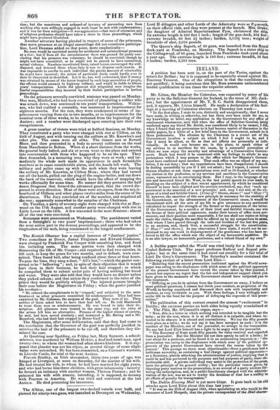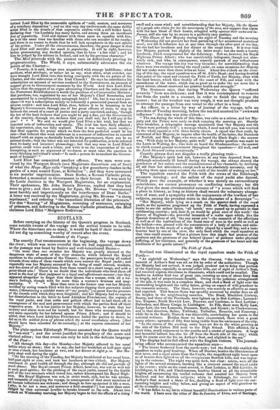IRELAND.
A petition has been sent in, on the part of the Tories, against the return for Belfast ; but it is supposed to be especially aimed against Mr. Emerson Tennent. One of the allegations is that the candidates are not qualified ; it being notorious that Mr. Ross possesses unincumbered landed qualification to ten times the requisite amount.
Mr. Litton, the Member for Coleraine, was expected by many of his party to be the Solicitor-General for Ireland, in the room of Mr. Jack- son ; but the appointment of Mr. T. B. C. Smith disappointed them, and, it appears, Mr. Litton himself. He made a declaration of his feel- ings at a meeting of Coleraine electors on Thursday last week- " In the first place, I state to you, distinctly and unequivocally, that I never have made, in writing or otherwise, nor has there ever been made for me, to my knowledge or belief, any application to the Government for any office of emolument whatsoever, save that when the office of Solicitor-General, lately conferred upon my friend Mr. Smith, was considered likely to be vacant, I did, when I found that my pretensions to it had become matter of discussion in the public papers, by a letter of a few brief lines to the Government, submit to it these pretensions. The allusion by the Chairman to a recent act of the Government involves a subject on which I feel I ought to be, and I fear I must be silent, so far as that act affects me personally or indi- vidually. It would not become me, in this place, to speak either of my services in or sacrifices for the cause, by a successful promotion of which we now enjoy the security and advantage of a Conservative Govern- ment. Much less would it be consistent with my feelings to allude to any pretensions which I may possess to the office which her Majesty's Govern- ment have conferred upon another. That such office was an object of my am- bition, I do not deny ; that my expectations have been disappointed, I should be dealing uncandidly by you if I did not admit ; hut I repeat, I cannot here discuss whether or not these expectations were well or ill-founded, or whether my station in the profession, or my services and sacrifices in the Conservative cause, warranted me in entertaining them. But I may, in the language of my late and lamented friend Mr. West, in the last public speech he ever made, in speaking on the subject of a then recent appointment, by which he considered himself to have been slighted and his services overlooked, say, that 'such ap- pointment is the assertion of a new principle,' and, may I not add, at the ex- pense of a tried and faithful friend. (Cries of" Shame, shame!" and "Hear ! ") If, however, the assertion of this new principle be necessary for the stability of the Government, or the advancement of the Conservative cause, it would be inconsistent with all the acts of my life to give utterance to any sentiment calculated to impair the strength of the former or the promotion of the latter. If the Government, by a sacrifice of their tried and faithful friends, can win the favour of their political opponents, render their tenure of office more per- manent, and their position more respectable, I for one shall not repine at being made the victim, though the sacrifice be offered up by my companions in arms, with whom I have passed through the toils and troubles of the last five years, in an anxious, and, thank God, a successful struggle for the constitution. (" Hear!" and cheers.) In any observation I have made, I would not be un- derstood to say one word in disparagement of the gentleman who has been se- lected to fill the office which was the object of my honourable ambition. He is an able lawyer, an honourable gentleman, and a valued friend of my own."
A Dublin paper called the World was tried lately for a libel on the Cashel Reform Club. The paper professes Radical and Repeal prin- ciples ; but at the same time it had stood out steadily for a fair trial of Lord De Grey's Government. The Saturday's number contained the following extract of a letter from Lord Eliot- " Believing that the recent prosecution instituted against the World news- paper was owing to the displeasure with which some of the political opponents of the present Government have viewed the course taken by that journal, I cannot but express my regret that the fair and independent support which you have given to the measures of the Government should have subjected you to this treatment.
"Differing as you do in opinion from the Government on many, I believe on most political questions, I cannot but think your conduct, as proprietor of the World, in having considered and discussed their acts with impartiality and candour, as very creditable to you. With these feelings, I very willingly sub- scribe 50/. to the fund for the purpose of defraying the expenses of this prose- cution."
The publication of this extract created the utmost "excitement" in Dublin ; the extreme parties on both sides being equally scandalized at it. The Pilot, Mr. O'Connell's organ, says-
" Now, this is a letter in which nothing was intended to be tangible but the bribe : as for the rest, where it is at all distinct it is culpable, and where in- tended to be obscure it is absurd and contradictory. We say the fifty pounds were given as a bribe; we do nut say it has been accepted as such : it is the conduct of the Minister, not of the journalist, we arraign in the transaction. No one but Lord Eliot himself base right to be angry with the journalist. " The Secretary of State sends fifty pounds for value received and expected from a journalist. But the Minister did not dare openly to call it a bribe; he cast about for a pretence, and he found it in an unbecoming imputatim ' the prosecution was owing to the displeasure with which some of the political op- ponents of the present Government have viewed the course taken by the journal.' This passage we deem most objectionable—from a gentleman and a nobleman unworthy, as containing a foul charge against political opponents— as a Secretary, plainly attacking the administration of justice, implying that it could be and was perverted to the purposes and bad purposes of party, more oh- jectionable still. A private individual may assist in the protection of the press, upon the principle of its general utility ; but the particular reason given, by imputing party motives to the prosecution, is an avowal of a party anicnns dic- tating the subscription, and, in a public functionary charged with the adminis- tration of the law, was an act to render the decisions of that law a nullity in its effects of penalty for transgression."
The Dublin Evening Mail is yet more bitter. It goes back to its old attacks upon Lord Eliot about this time last year- " It was on the 27th of August 1841, when speculating on who would be the successor of Lord Morpeth, that the private correspondent of the Mail charao.
tensed Lord Eliot by the memorable epithets of ' cold, austere, and moreover of a crotchety disposition '; and on this very day twelvemonth the same skilful artist filled in the details of that expressive outline with a still bolder hand, declaring that 4 his Lordship has many faults, and among them an inordinate kve of popularity. Cold and distant with those upon an equality with him, he is at the same time too familiar with those who can minister to his vanity; and there is no reason to doubt that he will lack sycophants in the new sphere of his action. Under all the circumstances, therefore, the great danger is that Lord Eliot will sacrifice too much to popularity. It will be right, however, before pronouncing any decided opinion, that he have a fair trial'; and let him be judged by his actions in Ireland, and not by his previous character." The Mail proceeds with the present case as definitively proving its prognostication. The World, it says, substantially advocates the six points of the Charter- " Poverty, it is said, brings men acquainted with strange bedfellows: what accident, what attribute, or rather let us say, what whim, what crotchet, can have brought Lord Eliot into this loving contiguity with the six points of the Charter, and the subversion of the Irish Church ? He says he contributes his subscription on account of services rendered to the Government, on account of support given to Government measures by the World. And does Lord Eliot believe that the support of an organ advocating Chartism and the subversion of the Protestant Establishment is worth the purchase of a Conservative Minister; that purchase, too, negotiated by one of her Majesty's Chief Secretaries, and accompanied by a complimentary autograph letter ? Oh, but it was not a pur- chase—it was a subscription merely to indemnify a prosecuted journal from an adverse verdict : and does Lord Eliot, then, believe it to be becoming in her Majesty's Government, through one of her great officers of state, to step in between the award of a court of justice and a party convicted, and say, 'though the law of the land declares that you ought to pay a fine, yet the Government of the country, through me, declares that you shall not, for I will pay it for you.' • • • We said we would give Lord Eliot a fair trial, but that we expected acts of indiscretion and vanity. The trial has been fairly afforded ; the expectation, alas, too fully realized. That it was vanity, mere vanity— that fatal appetite for praise which we from the first predicted would be his ruin—that induced this weak nobleman in a moment of indiscretion to commit himself with an organ so decidedly hostile to his government, there can be no rational doubt ; that the letter was not intended for publication, is to be inferred from its hasty and incorrect phraseology; but that any man in Lord Eliot's position could write such a letter, and write it on the expectation of its not transpiring, is such an argument of weakness as must raise the question in every thinking individual's mind-4 Is such a person fit to conduct the Govern- ment of Ireland ? ' "
Lord Eliot has committed another offence. Two men were con- victed by the Westport Bench (one Magistrate dissentient out of four) of what the Mayo iEgis calls "breaking a few gooseberry-bushes in the garden of a man named Egan, at Killadine "; and they were sentenced to six months' imprisonment. Dean Burke, a Roman Catholic priest, forwarded a memorial to Government in their favour. It was sent by the Lords Justices to the Westport Magistrates, for an explanation. Their spokesman, Mr. John Dennis Browne, replied that they had none to give ; and then sending for Egan, Mr. Browne "commented most harshly and impertinently on the interference of Dean Burke." A letter was received by the Magistrates, giving Mr. Browne "a sharp reprimand," and ordering "the immediate liberation of the prisoners." For this " flouting " of Magistrates, reversing of sentences, enlarging of prisoners, and deferring to the Roman Catholic priesthood, the Mail christens Lord Eliot "Mulgrave Redivivus."



























 Previous page
Previous page